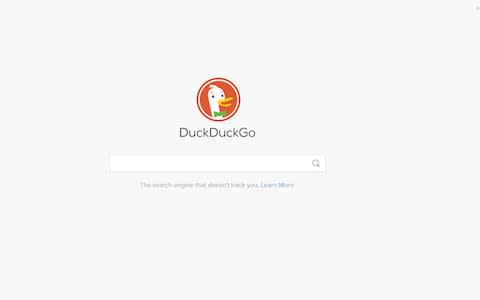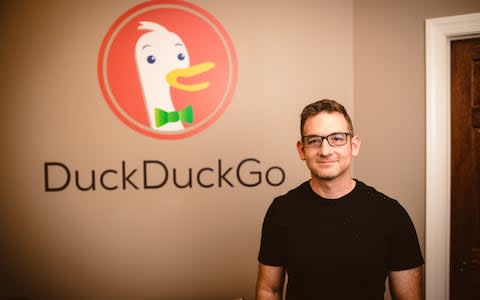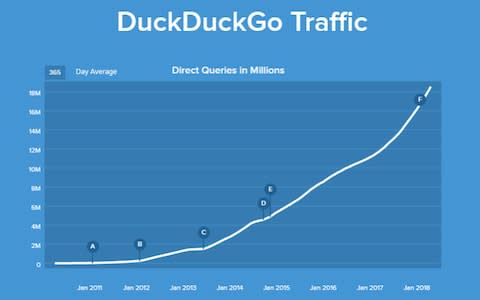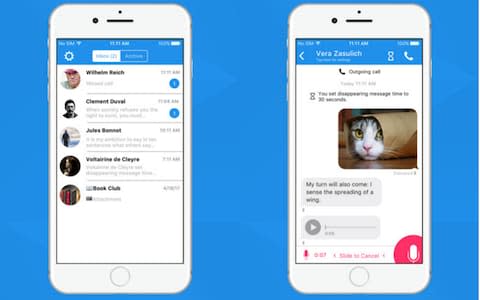DuckDuckGo: The private search engine standing up to Google

After years of giving data up laissez-faire, more people are realising the web has made nearly every aspect of their lives visible to advertisers and tech companies in ways they hadn’t imagined.
The Cambridge Analytica scandal showed how tech giants have come to flaunt user privacy, as the political research company used tools provided by Facebook to obtain data on millions of users from an app developer.
It’s not just Facebook. Search giant Google holds millions of points of data on every user, far more than the amount of data the average Facebook user has given up, from your daily movements to your phone history.
But one internet search company believes things could be different. According to Gabriel Weinberg, founder of the alternative search engine DuckDuckGo, getting privacy on the web “should be as easy as closing the blinds”.
This year will mark 10 years since the plucky, private search engine, designed to rival Google but with a focus on private browsing, first made its way on to hacker forums and Reddit. It has survived despite its tiny size and is a profitable business, showing you don't need to track users to all corners of the internet to be a successful online outfit.
DuckDuckGo operates in a similar manner to Google search but users can search the web without being tracked.

On DuckDuckGo, adverts can’t “follow you around” the web. It doesn’t track users and its browser is private. It provides advertising simply based on keyword searches. Users can easily delete their history instantly, while it has recently added options to its browser to protect data when users visit other websites.
The search experience itself is similar to Google, with images and news searches. DuckDuckGo also recently launched an app version of the service, which features its trademark Duck logo and "fire" button at the top which can be tapped to burn all search history.
DuckDuckGo launched in 2008, conceived as a solo project by Massachusetts Institute of Technology graduate Gabriel Weinberg. Then 27, Weinberg’s project began as a server rack in his basement as a small way to challenge the search hegemony of Google. By the mid 2000s, Google was already all-conquering in the search market, and rivals like Yahoo and Bing had fallen away.
DuckDuckGo now processes 25 million searches each day and ran close to 6bn searches last year. It is small but profitable, having only hired its first employee in 2011, and now its team of 50 odd staff, most of them home-workers scattered across the globe, manage the website and app, compared to Google’s 88,000 employees.

“The principle is to raise the standard of trust online,” says Weinberg, a 38-year-old from Atlanta who now runs DuckDuckGo from a small office in the tiny town of Paoli, Pennsylvania, thousands of miles from Silicon Valley. “We wanted to show we could make a real alternative to Google that mainstream people could switch to.”
While it started as a search engine, DuckDuckGo now has apps for Android and iPhone. It can also be used to rate websites from A to F on how much data they attempt to skim from the user.
Weinberg is expecting a jump from the ongoing privacy scandal surrounding Facebook, but he believes this is just the start of a renewed focus on privacy. “Facebook is going to do this investigation and I fully expect to find many other breaches than Cambridge Analytica,” he says.
“We recently surveyed the number of users trying to improve their privacy in the US after the Facebook scandal and the group has expanded by 15pc. When there is media scrutiny on these issues people want to protect themselves.”
Mr Weinberg moved to Paoli with his wife shortly before he conceived of DuckDuckGo. The name, apparently, has no hidden meaning, other than being inspired by the children’s game Duck Duck Goose. “Really it just popped in my head one day and I just liked it,” Mr Weinberg wrote on an online forum.
While Facebook is one of the biggest trackers on the web, the real rival for DuckDuckGo is Google. “Google tracks us even more across the web,” Mr Weinberg says. “They have crazy amounts of your history.”

Google’s executives so far seem to have escaped the data scandal unscathed. While Mr Zuckerberg was dragged before senators to take a hit, Google has quietly hidden the fact almost any data you give it is stored, from your movements to your search queries. Users who downloaded their Google data would be met with several gigabytes of data.
Of course, DuckDuckGo is a minnow among these names. If privacy is its core principle, does making money matter to Mr Weinberg?
“What we are doing is showcasing that there can be a profitable privacy company,” he says, although DuckDuckGo declined to give revenue figures.
Meanwhile, Facebook has stressed repeatedly that without access to user data its service could not remain free. The company’s chief operating officer Sheryl Sandberg said earlier this month: “Our service depends on your data... We don’t have an opt-out at the highest level. That would be a paid product.”
But Weinberg disagrees. “With Facebook there is this strawman argument that you can only make money if you track people to the ends of the Earth,” he says.
“Facebook could still be a hyper-profitable business without this tracking, or without combining it with information from off Facebook or continue tracking you when you had logged out.”

DuckDuckGo is not immune from the wider problems of the internet. It has had to take down a number of fake cryptocurrency adverts itself, much like other web companies
DuckDuckGo’s growth can be seen as part of a growing trend towards privacy focused apps. WhatsApp, the messaging app owned by Facebook, uses end-to-end encryption and is hugely popular with 1.5bn users.
But other independent apps are benefitting. Weinberg himself uses Signal, which can be used to link up to user’s text messages to send encrypted messages, encrypted work-sharing app Resilio and virtual private network apps.

The regulatory mood is also changing in favour of privacy. With the introduction of the General Data Protection Regulation in the European Union and UK, companies will have to be more responsible with how they collect and store data or face fines. Margrethe Vestager, the EU data commissioner and nemesis of Google, is a keen DuckDuckGo user.
Weinberg thinks it is a positive step, although enforcement and education will be key. “It won’t change a lot of these structural issues around the Facebook/Google duopoly, or how much data they are able to take from people. I don’t think people can consent fully in an informed way.”
When Mark Zuckerberg appeared before the US Congress last week to own up to his company’s failings, many felt it would be the young billionaire’s undoing. Yet for now the chief executive seems to have weathered the media storm, bowed but unbroken.
The real signs of change will be in shifts in user behaviour. Mr Zuckerberg said there had been “little meaningful impact” of users deleting Facebook or amending privacy settings.
That said, Weinberg feels this scandal could be different: “What this story did, unlike many others, it felt like a harm and it felt like a manipulation. Millions more people have felt it.”
DuckDuckGo is a tiny fraction of web traffic. But its small successes suggests there is a market for keeping people who want to keep their data to themselves, and for the time being, it seems, that market is only growing.
Under lock and key: the apps that keep your data safe

Signal: Launched in 2014, Signal is an app for iPhone or Android that links up to a user’s phone number to send encrypted texts and voice calls to other users. It is used by the NSA whistleblower Edward Snowden.
Protonmail: Founded by former CERN researchers, Proton is an encrypted email service. Based in Switzerland, the email service doesn’t require any personal information to create an account and the all emails are automatically end-to-end encrypted.
Mastadon: A micro-blogging site similar to Twitter, Mastadon is a social networking site. However, it is decentralised and no one corporation controls the service. Users communicate by sending “toots” rather than Tweets.
Telegram: Founded by Russian entrepreneur Pavel Durov, Telegram is a messaging app where you can enable end-to-end encryption for messages and calls and send self-deleting messages. It was recently banned in Russia.
Technology intelligence - newsletter promo - EOA

